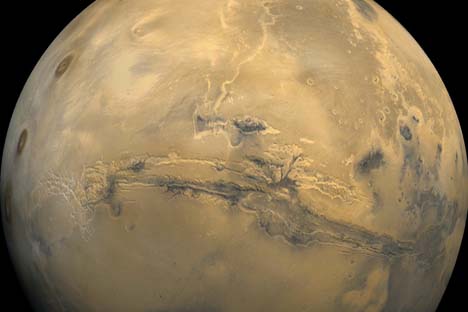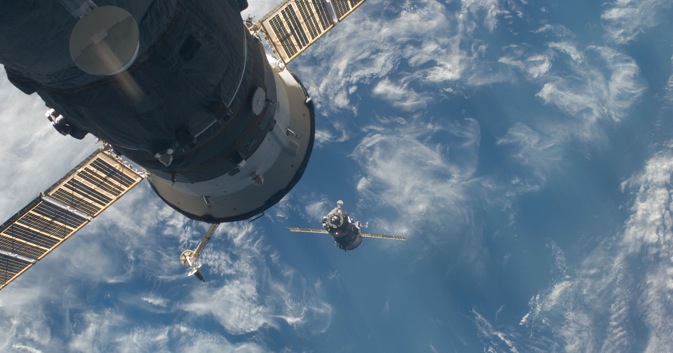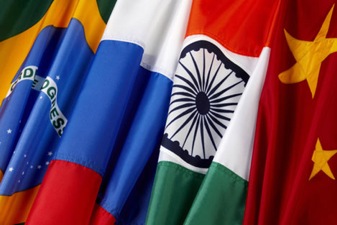Why there is not enough space in the Final Frontier

What Russia needs are clear goals – it could either be a colony on the Moon or a manned mission to Mars – anything to attract the next generation of scientific pioneers. Source: NASA
Space may well be limitless, but up there quality real estate is somewhat limited. In fact, there are just two places in the entire solar system where humans can hope to establish colonies in the next 100 years. These are the Moon and Mars.
A quick glance at history shows that on our own planet we reached the limits of exploration and conquest three centuries ago.
During the colonial era, pirates such as Francis Drake of England were backed by their countries to find new land, gold and slaves – not necessarily in that order – for the greater glory of their country.
The nations of Western Europe despatched – or more often expelled – their surplus and unwanted populations into the newly ‘discovered’ territories of North and South America, Africa and Oceania, eventually claiming entire continents in the name of their king, queen or Pope.
The parallels to colonialism are hardly far-fetched. American Neil Armstrong, the first man on the moon, wrote to National Public Radio in 2010 on the need for Americans to return to earth’s only satellite: “Some question why Americans should return to the moon. After all, they say, ‘we have already been there’. I find that mystifying. It would be as if 16th century monarchs proclaimed that ‘we need not go to the New World, we have already been there’. Or as if President Thomas Jefferson announced in 1803 that Americans ‘need not go west of the Mississippi, the Lewis and Clark expedition has already been there’. Americans have visited and examined six locations on Luna, varying in size from a suburban lot to a small township. That leaves more than 14 million square miles yet to explore.”
America means business
Many Americans share Armstrong’s colonising zeal. As an American expert declared after the Curiosity rover landed on Mars: “The red planet is firmly in American hands.”
After decades of drift at NASA, the United States is now incubating tomorrow’s private space adventurers. These corporations are now beginning to gatecrash what was once the exclusive preserve of countries.
According to the California Institute of Technology, “Private corporations have ambitious agendas for orbital payload delivery and astronaut transport, space tourism, and even interplanetary travel. The share of space technologies developed and built in the private sphere continues to increase as both old and new companies ramp up their space efforts. Space agencies around the world, including in the United States, are increasing their reliance on these services to reduce costs and avoid long development cycles.”
In May 2010, the PayPal entrepreneur Elon Musk’s company, SpaceX, made history when his Dragon spacecraft successfully docked with the International Space Station. On June 21, 2013 the company was awarded a contract to launch Turkmenistan’s first satellite to geostationary orbit.
SpaceX faces stiff competition from a long line of companies, including Boeing, Sierra Nevada Corporation and PlanetSpace, that will be competing to carry astronauts and satellites into orbit. Chicago-based PlanetSpace, which is co-owned by India-born Chirinjeev Kathuria, is eyeing a $3 billion commercial contract that will ship cargo to the International Space Station (ISS).
And that’s just the big boys, says Quartz magazine. “Lots of other private American companies enter each year to win prizes designed to spur innovation in manned space flight and moon landings.”
Across the Atlantic, British entrepreneur Richard Branson’s Virgin Galactic is selling tickets for flights in SpaceShipTwo and has unveiled LauncherOne, its small satellite launch system.
Another success story is the Lithuanian Space Association, which is using its expertise gained from the Soviet Union’s Salyut and Mir orbital stations and the Buran space shuttle to contribute to American and European space programmes. The Association claims hundreds of its engineers have contributed to NASA programmes such as Cassini and Galileo.
The plethora of private players gives the West a huge advantage in colonising space. Its multinational corporations already own most of the top 100 consumer brands, and the power of its private enterprise could very well replicate that dominance in space.
Emerging or submerging?
The Russian, Chinese and Indian space programmes are largely state funded. Among the three, only China is showing the urgency required to colonise space.
Russia’s space programme is unable to defy gravity. On July 2 at Kazakhstan’s Baikonur Cosmodrome, the world’s busiest spaceport, in a scenario more common in the 1950s than the present, a 700 tonne Russian rocket started returning to the launch site, seconds after liftoff. The Proton M launch vehicle had to be destroyed. While nobody was hurt, the toxic cloud of the explosion forced the 70,000 citizens of Baikonur to stay indoors.
It makes you wonder who’s in charge of the Russian Space Agency – scientists or bureaucrats. Russia needs a Sputnik moment as something is seriously wrong with the country’s space programme, which has lurched from one failure to another.
Vladimir Putin has announced funding of $50 billion to boost the space programme. But if money could buy success, Qatar and Saudi Arabia would have advanced space programmes. What Russia needs are clear goals – it could either be a colony on the Moon or a manned mission to Mars – anything to attract the next generation of scientific pioneers.
India and China: Contrasting styles
After its 100th successful satellite launch, an unmanned lunar touchdown, and a rover ready to be rocketed to Mars, India’s space programme looks solid – like an elephant. The problem is the elephant's pace.
India cannot afford to be 10-15 years behind China. Beijing’s first manned mission was in 2003; India’s is unlikely to be before 2017. It’s not that India lags in technology; it simply lacks the will.
Where the Chinese believe success in space boosts national pride, India’s geriatric political leadership cannot be accused of harbouring such sentiments. The upshot – China is setting technological benchmarks even as India’s achievements, while commendable, have a sense of déjà vu.
The biggest problem is funding – a measly $1.3 billion. In the last decade the number of India's space missions increased from three to around 14 annually. At the same time, the number of scientists, engineers and support staff involved in the space sector remained unchanged at 16,000. In contrast the Chinese programme employs over 120,000 technical staff.
Indeed, if the West is strapping on all available boosters, it is largely in response to China’s strides in space. Beijing arrived late to the party, but it is now notching up successes reminiscent of the USSR-USA space race of the 20th century.
In 2020 China will be in a club of one. That year when the ISS is decommissioned and meets a fiery end over the Pacific Ocean, China will become the only nation to have a space station. That’s also the year when the first Chinese men – or women – will walk on the Moon.
Tapping untold wealth
Nations that have access to space will dominate those left below. It's as simple as that. In the decades ahead, as the earth’s finite resources begin to deplete, the mining of the Moon and the asteroids will become viable. Only nations having the ability to extract resources in space will build colonies or large space stations. Large rotating space stations alone can generate the artificial gravity required for humans to avoid the debilitating effects of prolonged weightlessness.
Also, space flight will change how we travel just as the internet transformed the way we communicate. “The internet has opened up the world to rapid information exchange. Suborbital space flight will do the exact same thing to travel,” Kathuria of PlanetSpace told this writer.
It doesn’t take a rocket scientist to figure that if the BRICS nations don’t colonise space, twenty-first century cities on the Moon and Mars are more likely to be named New Seattle, New Washington and New Paris than New Moscow, New Bangalore or New Beijing.
All rights reserved by Rossiyskaya Gazeta.
Subscribe
to our newsletter!
Get the week's best stories straight to your inbox




